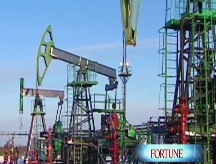$250 oil? Don't bet on it
The CEO of Russian oil firm Gazprom, the world's largest energy company, is predicting a huge jump in the price of oil. Could he possibly be right?


NEW YORK (CNNMoney.com) -- If you think $135 oil is bad, you ain't seen nothing yet. That, at least, is the take from the head of the world's largest energy firm.
Alexei Miller, the CEO of Russian oil company Gazprom (OGZPY), told reporters at an event in France yesterday that he expects the price to rise to...wait for it...$250 a barrel by 2009.
This is a stunning prediction considering that many of Miller's U.S. and European counterparts have been busy trying to argue that oil prices will go down - they, of course, are trying to ward off criticism about their companies' record profits.
Now Miller has more than a vested interest in seeing oil prices rise higher. So his expectations of crude nearly doubling after already rising nearly 45% this year has to be taken with several billion grains of salt.
Still, could oil head higher from here? It's possible. A stronger dollar would limit the upside, but as I've discussed in recent columns, the Federal Reserve's tough talk about the dollar is just that...talk.
Even if the Fed keeps rates steady, as expected, for the next few months, we could see a weaker dollar and higher commodity prices since the European Central Bank has hinted that it may raise rates at its next meeting.
What's more, because of supply and demand issues, Morgan Stanley oil analyst Ole Shorer predicted last week that crude could hit $150 a barrel by July 4.
But $250 just seems crazy - even with strong demand from India and China and tight supplies.
Many economists, oil analysts, market strategists and fund managers I've spoken to in the past few months agree that speculation is a big factor behind oil's surge. The price of oil may be artificially inflated by as much as $20 to $30 a barrel because of hedge funds and other traders making bullish bets on crude and bearish bets on the dollar.
In other words, oil should be trading closer to $100 to $110 if supply and demand were the only issues in play. Others say the "fundamental" level is even lower.
"Like everyone else, I've been taken aback by the run in oil we've seen in the past few weeks," said Stephen Thornber, portfolio manager for the Threadneedle Global Equity fund and head of the global energy team for Threadneedle in London. "This has got the feel, very short-term, of a bubble. If the price were to drift back $15 to $20, I wouldn't be surprised. Oil has run too far too fast," he said.
What's more, we could see some relief on the demand front soon.
American consumers have already started changing their behavior. They're cutting back on driving and have also been buying more fuel efficient cars, to the consternation of GM (GM, Fortune 500) and Ford (F, Fortune 500).
And as I've pointed out in another recent column, if the ECB does raise rates this year, the eventual outcome might be a European economic slowdown akin to what's currently going on here. That, in turn, would also lead to lower demand for oil and a lower price for oil.
Deutsche Bank chief energy economist Adam Sieminski said during testimony at a House hearing on the future of oil this morning that oil prices should average around $105 a barrel over the next year because "demand is showing signs of slowing."
Nonetheless, it's difficult, if not impossible, to really gauge with any accuracy where oil will be months from now.
Sieminski pointed out in his testimony that since 1999, analysts have "consistently under-estimated" crude oil prices by an average of about 31%.
And Thornber said that a variety of factors, including more tensions with Iran or a bad hurricane season in the United States, could lead to oil soaring past $150 and on towards $200 in short order.
So who knows? Gazprom's Miller may have the last laugh after all.
Issue #1 - America's Money: All this week at noon ET, CNN explains how the weakening economy affects you. Full coverage.
Gas prices have climbed to record levels. Are you feeling the pinch? Tell us how gas prices are affecting you and what you're doing to cope. Send us your photos and videos, or email us and tell us what you think. ![]()




